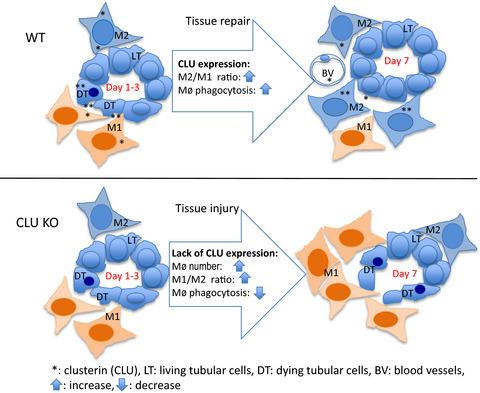当前位置:
X-MOL 学术
›
Immunol. Cell Biol.
›
论文详情
Our official English website, www.x-mol.net, welcomes your feedback! (Note: you will need to create a separate account there.)
Clusterin regulates macrophage expansion, polarization and phagocytic activity in response to inflammation in the kidneys
Immunology and Cell Biology ( IF 4 ) Pub Date : 2020-09-15 , DOI: 10.1111/imcb.12405 Xiaodong Weng 1, 2 , Haimei Zhao 1, 3 , Qiunong Guan 1 , Ganggang Shi 1, 4 , Shijian Feng 1 , Martin E Gleave 1 , Christopher Cy Nguan 1 , Caigan Du 1
Immunology and Cell Biology ( IF 4 ) Pub Date : 2020-09-15 , DOI: 10.1111/imcb.12405 Xiaodong Weng 1, 2 , Haimei Zhao 1, 3 , Qiunong Guan 1 , Ganggang Shi 1, 4 , Shijian Feng 1 , Martin E Gleave 1 , Christopher Cy Nguan 1 , Caigan Du 1
Affiliation

|
Clusterin (CLU) is a multifunctional protein localized extracellularly and intracellularly. Although CLU‐knockout (KO) mice are more susceptible to renal ischemia‐reperfusion injury (IRI), the mechanisms underlying the actions of CLU in IRI are not fully understood. Macrophages are key regulators of IRI severity and tissue repair. Therefore, we investigated the role of CLU in macrophage polarization and phagocytosis. Renal IRI was induced in wild‐type (WT) or CLU‐KO C57BL/6 mice by clamping the renal pedicles for 30 min at 32°C. Peritoneal macrophages were activated via an intraperitoneal injection of lipopolysaccharide (LPS). Renal tissue damage was examined using histology, whereas leukocyte phenotypes were assessed using flow cytometry and immunohistochemistry. We found that monocytes/macrophages expressed the CLU protein that was upregulated by hypoxia. The percentages of macrophages (F4/80+, CD11b+ or MAC3+) infiltrating the kidneys of WT mice were significantly less than those in CLU‐KO mice after IRI. The M1/M2 phenotype ratio of the macrophages in WT kidneys decreased at day 7 post‐IRI when the injury was repaired, whereas that in KO kidneys increased consistently as tissue injury persisted. In response to LPS stimulation, WT mice produced fewer M1 macrophages, but not M2, than the control did. Phagocytosis was stimulated by CLU expression in macrophages compared with the CLU null controls and by the exogenous CLU protein. In conclusion, CLU suppresses macrophage infiltration and proinflammatory M1 polarization during the recovery period following IRI, and enhances phagocytic activity, which may be partly responsible for tissue repair in the kidneys of WT mice after injury.
中文翻译:

凝聚素调节巨噬细胞扩张、极化和吞噬活动以响应肾脏炎症
Clusterin (CLU) 是一种定位于细胞外和细胞内的多功能蛋白质。尽管 CLU 敲除 (KO) 小鼠更容易受到肾缺血再灌注损伤 (IRI) 的影响,但 CLU 在 IRI 中的作用机制尚不完全清楚。巨噬细胞是 IRI 严重程度和组织修复的关键调节剂。因此,我们研究了 CLU 在巨噬细胞极化和吞噬作用中的作用。通过在 32°C 下夹住肾蒂 30 分钟,在野生型 (WT) 或 CLU-KO C57BL/6 小鼠中诱导肾 IRI。通过腹膜内注射脂多糖 (LPS) 激活腹腔巨噬细胞。使用组织学检查肾组织损伤,而使用流式细胞术和免疫组织化学评估白细胞表型。我们发现单核细胞/巨噬细胞表达因缺氧而上调的 CLU 蛋白。巨噬细胞百分比 (F4/80+ , CD11b +或 MAC3 +)在 IRI 后浸润 WT 小鼠的肾脏显着少于 CLU-KO 小鼠。WT 肾脏中巨噬细胞的 M1/M2 表型比率在 IRI 后第 7 天损伤修复时降低,而 KO 肾脏中的 M1/M2 表型比率随着组织损伤的持续而持续增加。响应 LPS 刺激,WT 小鼠产生的 M1 巨噬细胞比对照组少,但 M2 没有。与 CLU 无效对照和外源性 CLU 蛋白相比,巨噬细胞中的 CLU 表达刺激了吞噬作用。总之,在 IRI 后的恢复期间,CLU 抑制巨噬细胞浸润和促炎 M1 极化,并增强吞噬活性,这可能是 WT 小鼠损伤后肾脏组织修复的部分原因。
更新日期:2020-09-15
中文翻译:

凝聚素调节巨噬细胞扩张、极化和吞噬活动以响应肾脏炎症
Clusterin (CLU) 是一种定位于细胞外和细胞内的多功能蛋白质。尽管 CLU 敲除 (KO) 小鼠更容易受到肾缺血再灌注损伤 (IRI) 的影响,但 CLU 在 IRI 中的作用机制尚不完全清楚。巨噬细胞是 IRI 严重程度和组织修复的关键调节剂。因此,我们研究了 CLU 在巨噬细胞极化和吞噬作用中的作用。通过在 32°C 下夹住肾蒂 30 分钟,在野生型 (WT) 或 CLU-KO C57BL/6 小鼠中诱导肾 IRI。通过腹膜内注射脂多糖 (LPS) 激活腹腔巨噬细胞。使用组织学检查肾组织损伤,而使用流式细胞术和免疫组织化学评估白细胞表型。我们发现单核细胞/巨噬细胞表达因缺氧而上调的 CLU 蛋白。巨噬细胞百分比 (F4/80+ , CD11b +或 MAC3 +)在 IRI 后浸润 WT 小鼠的肾脏显着少于 CLU-KO 小鼠。WT 肾脏中巨噬细胞的 M1/M2 表型比率在 IRI 后第 7 天损伤修复时降低,而 KO 肾脏中的 M1/M2 表型比率随着组织损伤的持续而持续增加。响应 LPS 刺激,WT 小鼠产生的 M1 巨噬细胞比对照组少,但 M2 没有。与 CLU 无效对照和外源性 CLU 蛋白相比,巨噬细胞中的 CLU 表达刺激了吞噬作用。总之,在 IRI 后的恢复期间,CLU 抑制巨噬细胞浸润和促炎 M1 极化,并增强吞噬活性,这可能是 WT 小鼠损伤后肾脏组织修复的部分原因。



























 京公网安备 11010802027423号
京公网安备 11010802027423号